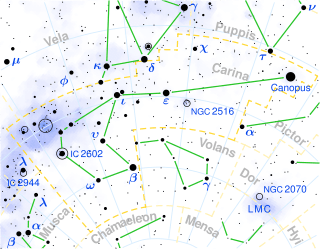V357 Carinae
V357 Carinae (a Car, a Carinae)[n 1] is an astrometric and spectroscopic binary in the constellation Carina. It is approximately 419 light years from Earth. The mean apparent magnitude of the system is +3.43.
 | |
| Observation data Epoch J2000.0 Equinox J2000.0 | |
|---|---|
| Constellation | Carina |
| Right ascension | 09h 10m 58.086s[1] |
| Declination | −58° 58′ 0.82″[1] |
| Apparent magnitude (V) | +3.41 - 3.44[2] |
| Characteristics | |
| Spectral type | B2IV-V[3] |
| Variable type | Eclipsing[2] |
| Astrometry | |
| Radial velocity (Rv) | 23.3[4] km/s |
| Proper motion (μ) | RA: −16.64[1] mas/yr Dec.: 15.00 mas/yr |
| Parallax (π) | 7.30 ± 0.35[1] mas |
| Distance | 450 ± 20 ly (137 ± 7 pc) |
| Orbit[5] | |
| Period (P) | 6.74469 d |
| Eccentricity (e) | 0.18 |
| Semi-amplitude (K1) (primary) | 21.5 km/s |
| Details | |
| Aa1 | |
| Mass | 9.15[6] M☉ |
| Radius | 5.0[7] R☉ |
| Surface gravity (log g) | 4.0[7] cgs |
| Temperature | 21,744[7] K |
| Age | 18.7[8] Myr |
| Aa2 | |
| Mass | 1.10[6] M☉ |
| Other designations | |
| Database references | |
| SIMBAD | data |
Location
The star appears 46.0' (0.7668°) ENE of Iota Carinae at the heart of the asterism and constellation which is skewed in having bulk of the stars away from the eastern, Canopus prow of the ship and close to the imagined sails of the ship, Vela.
Variability
V357 Carinae is a probable variable star; its brightness varies from magnitude +3.41 to +3.44 with a period of 6.74 days, which is its orbital period. It was classified as an eclipsing binary in Gaposchkin's original catalogue of variable stars,[9] although the variability was often considered doubtful.[3] It is now thought most likely to be a very shallow eclipsing binary.[2]
System
V357 Carinae is an astrometric binary, meaning its motion in the sky implies orbital motion about an invisible companion. It is also a single-lined spectroscopic binary, and possibly a triple system.[10] The two closest components orbit each other in 6.74 days, while the observed astrometric motion is much longer.[6]
Notes
- Pronounced: lower-case /eɪ/ /ˈkærɪnaɪ/ or /kæˈriːnaɪ/
References
- Van Leeuwen, F. (2007). "Validation of the new Hipparcos reduction". Astronomy and Astrophysics. 474 (2): 653–664. arXiv:0708.1752. Bibcode:2007A&A...474..653V. doi:10.1051/0004-6361:20078357.
- Avvakumova, E. A.; Malkov, O. Yu.; Kniazev, A. Yu. (2013). "Eclipsing variables: Catalogue and classification". Astronomische Nachrichten. 334 (8): 860. Bibcode:2013AN....334..860A. doi:10.1002/asna.201311942. hdl:10995/27061.
- Samus, N. N.; Durlevich, O. V.; et al. (2009). "VizieR Online Data Catalog: General Catalogue of Variable Stars (Samus+ 2007-2013)". VizieR On-line Data Catalog: B/GCVS. Originally Published in: 2009yCat....102025S. 1: B/gcvs. Bibcode:2009yCat....102025S.
- Evans, D. S. (1967). "The Revision of the General Catalogue of Radial Velocities". Determination of Radial Velocities and Their Applications. 30: 57. Bibcode:1967IAUS...30...57E.
- Buscombe, W.; Morris, P. M. (1960). "The Scorpio-Centaurus Association: I. Radial Velocities of 120 Bright Stars". Monthly Notices of the Royal Astronomical Society. 121 (3): 263–278. Bibcode:1960MNRAS.121..263B. doi:10.1093/mnras/121.3.263.
- Tokovinin, A.A. "Multiple Star Catalog". Retrieved 2019-09-01.
- Underhill, A. B.; et al. (November 1979). "Effective temperatures, angular diameters, distances and linear radii for 160 O and B stars". Monthly Notices of the Royal Astronomical Society. 189 (3): 601–605. Bibcode:1979MNRAS.189..601U. doi:10.1093/mnras/189.3.601.
- Tetzlaff, N.; Neuhäuser, R.; Hohle, M. M. (2011). "A catalogue of young runaway Hipparcos stars within 3 KPC from the Sun". Monthly Notices of the Royal Astronomical Society. 410 (1): 190. Bibcode:2011MNRAS.410..190T. doi:10.1111/j.1365-2966.2010.17434.x.
- Kukarkin, B. V.; Kholopov, P. N.; Fedorovich, V. P.; Kireyeva, N. N.; Kukarkina, N. P.; Medvedeva, G. I.; Perova, N. B. (1977). "62nd Name-List of Variable Stars". Information Bulletin on Variable Stars. 1248: 1. Bibcode:1977IBVS.1248....1K.
- Eggleton, P. P.; Tokovinin, A. A. (2008). "A catalogue of multiplicity among bright stellar systems". Monthly Notices of the Royal Astronomical Society. 389 (2): 869. Bibcode:2008MNRAS.389..869E. doi:10.1111/j.1365-2966.2008.13596.x.